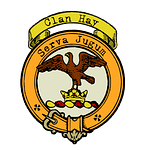Welcome back to "A Clan A Day Podcast," brought to you by BagTownClans.com. I'm your host, Colin MacDonald, and today we’re exploring the rich and fascinating history of Clan MacFie, also known as Clan MacDuffie or Clann Dhubhie in Gaelic. This storied clan is deeply rooted in the western islands of Scotland, particularly the rugged and beautiful Isle of Colonsay, and is one of the seven clans of Siol Alpin. Their legacy, though shadowed by hardship, is steeped in resilience, pride, and an enduring connection to Scotland’s ancient past.
Clan MacFie traces its lineage to the early Celtic inhabitants of Scotland. The name "MacFie" derives from Mac a’ Phi, meaning “son of the dark man.” This aligns with their membership in Siol Alpin, a group of clans descended from King Alpin, the father of Cináed mac Ailpín, the first King of Scots. Alongside clans like the MacGregors and Mackinnons, Clan MacFie carries the proud distinction of being among Scotland's oldest and noblest clans.
By the 15th century, the MacFies had firmly established themselves on Colonsay, where their chiefs ruled as island lairds. The clan’s name appears in the 1450 Gaelic manuscript detailing the lineage of Siol Alpin, linking them to the dark-haired Celts who contrasted with the Norse settlers in the Hebrides. Their heraldic emblem, the ship in full sail, symbolizes their island heritage and prowess in maritime pursuits.
Colonsay and its neighboring Oronsay are small islands but rich in history and beauty. The early MacFie chiefs were devout stewards of these lands. St. Columba himself landed here during his voyage to Iona in the 6th century, and the islands became home to the Priory of St. Augustine, an architectural gem second only to Iona Abbey.
The clan’s influence is immortalized in the MacFie burial grounds at the priory. A principal tombstone features a galley under sail and a two-handed sword, with the inscription: Hic jacet Malcolumbus MacDuffie de Collonsay. Close by, the famed MacDuffie Cross marked the traditional resting point for chiefs’ coffins on their journey to burial.
Clan MacFie’s fortunes shifted dramatically with the rise and fall of the Lords of the Isles. After the forfeiture of the Macdonald Lordship in 1493, the MacFies followed the Macdonalds of Islay, aligning themselves with the Isles' most powerful clan. However, this allegiance brought both opportunity and peril.
The 17th century was particularly tumultuous. In 1609, Donald MacFie of Colonsay joined other Hebridean chiefs in signing the “Statutes of Icolmkill,” a royal decree meant to bring order to the Isles. But in 1615, Malcolm MacFie, chief of the clan, sided with Sir James Macdonald of Islay in his rebellion against the Crown. This rebellion led to Malcolm’s capture and eventual murder at the hands of Coll MacDonald, better known as Colkitto. After this tragedy, the MacFie lands passed first to the Macdonalds and later to the Macneils, and the clan became a "broken" family.
Dispossessed of their lands, many MacFies dispersed. A branch of the clan sought refuge with the Camerons in Lochaber, where they became valued warriors. The MacFies fought bravely at the Battle of Culloden, where one clansman’s heroic actions against Cumberland’s dragoons became a poignant symbol of their enduring spirit.
The 19th century brought new hardships but also new legends. Ewen MacPhee, one of Scotland’s last outlaws, lived as a self-sufficient renegade on Loch Quoich. Meanwhile, Robert Andrew Macfie rose to prominence as a politician and free-trade advocate, serving as MP for Leith Burghs.
Clan MacFie’s revival owes much to the efforts of Dr. Earle Douglas MacPhee in the late 20th century. He led the movement to have Clan MacFie recognized as an active clan, culminating in the Lord Lyon's formal acknowledgment in 1981. Today, under the leadership of Clan Commander Iain Morris McFie, the clan thrives.
International gatherings every four years unite MacFies from around the world, celebrating their shared heritage. The clan tartan, registered in 1991, features a striking red and green pattern, proudly worn by its members.
The MacFies are a testament to resilience. From their ancient seat on Colonsay to their modern global diaspora, they have faced trials with unyielding courage and a fierce dedication to their heritage. Their motto, Pro Rege—“For the King”—echoes a commitment to loyalty and service that has defined the clan for centuries.
Thank you for joining me today on "A Clan A Day Podcast" as we celebrated the enduring legacy of Clan MacFie. Be sure to tune in tomorrow for another chapter in Scotland’s storied history. I’m Colin MacDonald, and as always, slàinte mhòr agus a h-uile beannachd duibh!










